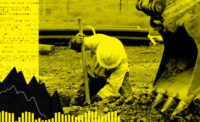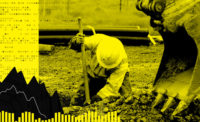Construction Workforce
Boosted by All Sectors, Construction Adds 25K Jobs in May

Heavy-civil sector led construction's jobs gains, adding 10,700.
Construction employment jumped in May, adding 25,000 jobs and the industry’s unemployment rate declined from the April and year-earlier levels, the Bureau of Labor Statistics has reported.
The bureau’s latest monthly employment report, released on June 2, shows that all construction sectors posted jobs increases in May.
The heavy and civil engineering construction category, which includes infrastructure, led the way, gaining 10,700 positions.
Specialty trade contractors added 7,300 jobs and the buildings construction sector saw its workforce rise by 6,600.
Overall, construction employment totaled 7,928,000 in May, a gain of 192,000 jobs, or 2.5%, over 12 months, according to BLS's preliminary figures.
Ken Simonson, Associated General Contractors of America chief economist, said in a statement, "Demand for construction workers remains strong, outside of homebuilding." Simonson added, "Contractors continue to report their primary challenge is finding qualified workers, not finding projects or most materials."
He noted that though residential segments added jobs in May, the numbers were relatively modest: residential building gained 2,400 and residential specialty trade contractors gained 100.
Construction’s unemployment rate dipped to 3.5% in May, from April’s 4.1% and also was down from the May 2022 level of 3.8%.
The BLS jobs figures are adjusted for seasonal differences; the bureau’s unemployment rates are not seasonally adjusted.
Industry economists also noted that contractors are continuing to increase workers' pay. Anirban Basu, Associated Builders and Contractors chief economist, said that "there will continue to be substantial upward pressure on construction worker compensation during the months ahead."
AGC pointed out that average hourly earnings for production and nonsupervisory workers rose 6%, to $34.07 in May. That percentage is a 19% "premium" above average earnings for all private-sector production workers, the association said.
Overall, the U.S. economy added a strong 339,000 jobs in May, and the unemployment rate rose to 3.7% from April's 3.4%.
But Basu cautioned that there are indications of economic weakness, including worsening credit conditions, high interest rates and concerns about commercial real estate. He said that "the onset of economy-wide recession later this year remains a possibility."



